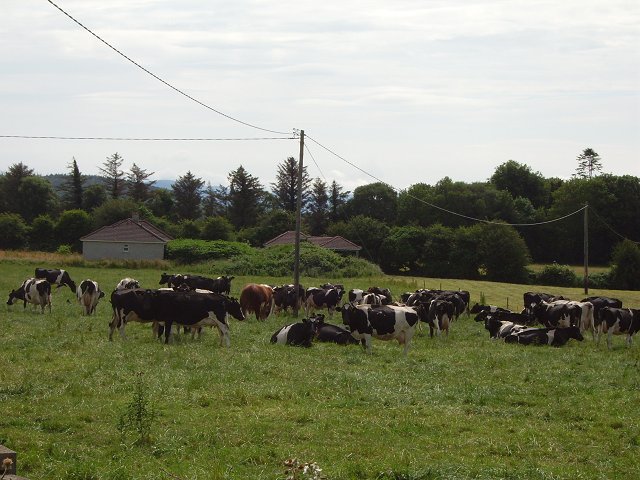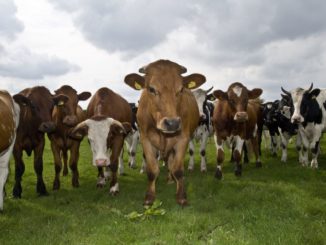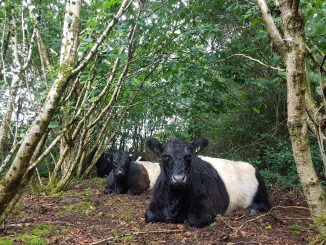
Sean McCabe (TASC) in Ireland
How can the agricultural sector in Ireland participate in a Just Transition to constructively address inequality in the sector and tackle climate change? Agriculture is not only a significant contributor to greenhouse gas emissions in Ireland, it is also the most unequal sector in the Irish economy in terms of income. When it comes to climate change and agriculture, we need to change how we think about the challenge of reducing emissions. Farmers and their communities must play a central role in planning climate action to ensure it is good for farmers as well as the planet.
When it comes to climate action in Ireland, discussion around the role of the agricultural sector can be fraught. This tension is understandable. Farming is the lifeblood of many communities around the country and Ireland rightly prides itself on the quality of its agricultural produce. There is a perception in Ireland that action to prevent climate change will negatively reshape Irish agriculture and, in doing so, undermine farmers’ livelihoods. This results in resistance to climate action from the very communities that stand to be most severely impacted by climate change.
There is clearly a need to find a deliberative approach to move beyond this impasse. To understand how we might achieve this, it is necessary to first look at what we know about the nexus between agricultural emissions, inequality and climate change in Ireland.
Firstly, we know that agriculture remains the single largest contributor to overall greenhouse gas emissions in Ireland, making up 33.3% of emissions in 2017.We also know that between 2016 and 2017, these emissions grew by 2.3% (from 19.646 Mt CO2 eq in 2016 to 20.213 Mt CO2 eq in 2017). The Environmental Protection Agency forecasts that, based on current policy measures, agriculture emissions will increase by 4.98% between 2017 and 2030. This is inconsistent with the findings of a Special Report released by the Intergovernmental Panel on Climate Change in 2018 which underscores the need for urgent emissions reductions. To stabilise the climate below or at 1.5oC of warming, science requires that CO2 emissions are reduced by 45% by 2030 and methane emissions are reduced by 35% or more by 2050, based on 2010 levels.
Secondly, TASC’s recently published report on inequality in Ireland, Cherishing All Equally – Inequality in Europe and Ireland 2019 highlights that the agricultural sector has the most severe inequality in income distribution of any sector in Ireland. This finding points to the sector having a significant reliance on unskilled workers employed by farm owners and a gulf in income between small farmers and large, profitable farms. There is also huge income differences based on the type of produce – between income-rich dairy farmers and income-poor sheep farmers, for instance. This level of inequality raises serious questions as to who in the sector stands to benefit from the Government’s Food Wise 2025 plan, which projects a €19 billion per annum increase in the agri-food industry by 2025. The strategy makes no mention of addressing inequality in the sector, but does intend to increase meat and dairy production which will have a negative impact on Ireland’s efforts to combat climate change.
Thirdly, Irish farmers stand to be severely impacted by climate change. The fodder crisis in 2018 highlighted the sensitivities that exist in the sector and served as a warning as to the potentially insurmountable challenge that climate instability will bring. Unfavourable weather late 2017 and early 2018 resulted in calls from farmers across the country for an emergency response to the situation and, in April, Minister for Agriculture Michael Creed announced that fodder would have to be imported from abroad. Resilience to the impacts of climate change will come at a cost and, set against the backdrop of inequality in the sector, this cost will result in hardship for small farmers and job losses for those employed on farms.
These three points underscore the pressing need for a Just Transition in the Irish agricultural sector to address agricultural emissions and inequality in the agricultural sector while also building the sectors resilience to climate impacts. Failure to plan a Just Transition to a low emissions agricultural future would not only discredit Ireland’s contribution to the global fight against climate change, resulting in significant fines from the European Union, it will also have serious negative consequences for small farmers and farm labourers in Ireland.
Around the world, trade unions are calling for a Just Transition to ensure urgent and fair climate action that protects workers and their communities. The Just Transition necessitates involving workers and their communities in the transition to low-emission economies both because they will be affected by the decision-making and because they are involved as individual citizens and consumers. Moreover, considering the social aspect of the transition towards a more sustainable economy and society is crucial for gaining social approval for the changes taking place. Public policies to reduce emissions will face social resistance, as well as significant political risks for the governments tasked with implementing them, if they are not accompanied by measures to mitigate or avoid negative impacts on workers, and their communities.
To date, Just Transition frameworks have been closely linked to the fossil fuel industry. However, in other emissions intensive sectors, such as agriculture, the potential for stranded workers and stranded communities resulting from climate action is high. By giving farmers and their communities ownership over climate action and facilitating a planning process that includes just transition measures, decision makers can prevent opposition and provide for a future for farming that offers both security and opportunity.
Just Transition and the Common Agricultural Policy
Awareness for the need of a Just Transition in Ireland is growing. The recently published Oireachtas Joint Committee Report on Climate Action, built on the recommendations of the Citizen’s Assembly on the same topic, calls for a Just Transition that is fair and protects vulnerable citizens, workers and communities and recommends the establishment of a Just Transition Taskforce. The report also highlights the need for a Just Transition in the agriculture sector and the anticipated reform of the Common Agricultural Policy (CAP) as an opportunity to support “marginal farmers” while meeting national and EU greenhouse gas emissions targets. However, the report stops short of unpacking the challenges of addressing a fair transition for the agricultural sector, or the current inequality that exists within the sector.
CAP reform is a core component of address climate change and inequality in the agricultural sector. Even a back of the envelope analysis of the 2017 Teagasc National Farm Survey and the 2017 CAP Beneficiaries Database indicates that the inequality in the agriculture sector is exacerbated by CAP payments. Irish farmers continue to be highly reliant on direct payments – the average total payment received in 2017 was €17,672 per farm and this accounted for 75% of average farm income. For average cattle and sheep farms, this figure came closer to 100% of net income. And yet the top 10 CAP beneficiaries in Ireland each earned over €200,000 from CAP payments in 2017, with the largest recipient receiving a payment of €238,989 – a staggering 914% more than the average farming income. Reform of the CAP must address inequality in the agricultural sector and must further incentivise sustainable agricultural practices. However, in addition to CAP reform, a broader, more holistic approach to a just transition for agriculture is also required.
Don’t “lock-in” farmers to unsustainable futures
We are sufficiently aware of the environmental and economic threats that are emerging. Every effort should be made to futureproof the wellbeing of the Irish agriculture sector. CAP reform must be coupled with measures to protect small farmers from external forces which they are not in control of. As discussed in the first part of this blog, climate impacts have the potential to drive struggling farmers off their land. Resilience to climate change in the agricultural sector must be prioritised. Similarly, the current dairy expansion policies under Government’s Food Wise 2025 plan are premised on a viable market price for dairy products. Should a no-deal Brexit or, to a lesser extent, Donald Trump’s trade dispute with the EU, result in significant tariff increases on exported dairy products in key markets, the repercussions will threaten the viability of many small dairy farms. Shifting consumer preferences away from dairy and towards vegan alternatives could also contribute to these uncertainties about future viability.
When observers are discussing national energy policies in the face of climate change, the term “lock-in” is used to describe new investments in fossil-fuel infrastructure which we know must become obsolete if we are to ensure a safe future. For example, an investment in a new coal fired power station commits, or lock-in, reliance on coal for another 30 or 40 years, and this stranded investment squanders the opportunity to diversify energy production to renewables. Investments in infrastructure on farms which is at risk of becoming obsolete can also be considered “lock-in”. The forecast herd increases in Food Wise 2025 is contrary to the global commitment to climate action and our national commitments to reduce emissions. Yet it encourages farmers to invest in the infrastructure necessary to facilitate herd increase, at the cost of potential diversification opportunities, and leaves them at risk of being stranded by future climate policy or market forces. This is the antithesis of preparing for a Just Transition for agriculture.
The broader rural context matters
To understand how a Just Transition might be enacted for the agricultural sector, it is necessary to focus on the broader societal context of rural Ireland today. A 2017 report by Teagasc and NUI Galway[1] based on 2016 census data highlights that much of rural Ireland has not seen the benefits of recovery following the deep recession that began with the Global Financial Crisis in 2007. Employment growth from the national recovery, strongly premised on Foreign Direct Investment, has been unevenly distributed and centralised in Ireland’s cities. In rural areas, outmigration and unemployment remain high and increase the further you go from the cities.
Considering that the stark income inequality in the agriculture sector is set against a backdrop of broader rural decline, it is unrealistic to expect that rural Ireland can play a leading role in climate action without structure, supports and robust and inclusive transition planning. The climate question then shifts from “Why don’t farmers take climate action more seriously?” to “How can climate action in rural Ireland be developed so that it contributes to a regeneration of rural areas and improve standard of living?”.
Developing a structured Just Transition planning process.
A robust approach for a Just Transition in the Irish agricultural sector could follow the approach adopted by the Federal Ministry for Economic Affairs and Energy in Germany to tackle the countries move to end energy production from coal. The government appointed 31 individuals, including trade unionists, employers, scientists, environmentalists and people who live in areas where coal is mined, to form the Commission on Growth, Structural Change and the Environment. The primary focus of the Commission’s work was to provide concrete prospects for new, future-proof jobs in the regions affected by mining closures.
The Commissioners were appointed in mid-2018 and their activities included regular meetings as well as visits to coal mining regions. Their report, published earlier this year, provides us with the most thorough attempt at national Just Transition planning to date. It lays out a detailed plan “to ensure that the end of coalfired power generation, and the energy transition, can continue to be borne by society in the future” by considering the far reaching, and fundamental structural changes required to equitably shares the benefits and burdens of the transition. A similar effort for Irish agriculture is essential if the Irish Government wishes to future-proof Irish agricultural jobs and provide a decent standard of living for all Irish farmers.
Local Wealth Building
The Commission’s report explored the prospects for existing, new, and future-proofed jobs in each mining area and proposed innovative options for the development of new industries locally. TASC has begun this work, on a smaller scale, in Ireland. We are currently partnering with the Foundation for European Progressive Studies on a project exploring the potential of the Local Wealth Building model to contribute to regenerating rural areas facing long-term population decline, the effects of climate change, Brexit, and financial insecurity.
Local Wealth Building is about supporting local businesses, especially in cooperation with local authorities, to generate jobs and address social challenges. To date, local wealth building models have been primarily deployed with significant success in densely populated urban areas such as Preston in the UK and Cleveland in the USA. In these examples, the cities’ municipal facilities are helping to implement a new model of large-scale worker-owned and community-benefiting businesses. The model relies on public sector procurement to support local enterprise and foster community networks and well-being.
Our project asks whether Local Wealth Building initiatives could be applied in rural areas of Ireland to regenerate rural communities by encouraging supporting farmers and enhancing in-migration through economic diversification, visible and effective climate action, and rising the standard of living.
This article first ran as a two part article on the TASC website. Part one is here and part two is here.
Sean McCabe
Sean holds an B.Sc in Applied Physics from Dublin City University and an M.Sc. in Development Practice awarded by Trinity College Dublin and University College Dublin. Prior to joining TASC, Sean worked as a Policy Officer with the Mary Robinson Foundation – Climate Justice for five years. During this time he engaged with the negotiations leading to the Paris Agreement and the 2030 Agenda for Sustainable Development. He also led the Foundation’s work on intergenerational equity. Sean spent five years working in the private sector, as a catastrophe risk analyst with Renaissance Reinsurance. He also spent 2 years working in a hospice in Kolkata, India, and worked with the Environmental Protection Agency in Sierra Leone building the agencies capacity in Geographic Information Systems.




